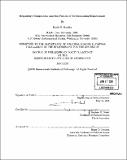Regulatory competition and the politics of environmental enforcement
Author(s)
Konisky, David M
DownloadFull printable version (16.20Mb)
Other Contributors
Massachusetts Institute of Technology. Dept. of Political Science.
Advisor
Stephen M. Meyer.
Terms of use
Metadata
Show full item recordAbstract
Does interstate economic competition result in states weakening their environmental regulation? Scholars have long been interested in this question. Of particular concern, is whether this type of behavior leads to a "race to the bottom" in U.S. state environmental regulatory behavior. Although there is a mature theoretical literature investigating the conditions under which regulators will use environmental measures as competitive instruments vis-a.-vis other states for attracting economic investment, the empirical literature has lagged far behind in testing the direct predictions of the race to the bottom argument. The purpose of this project is test the applicability of the race to the bottom argument in U.S. state environmental regulation. To test the race to the bottom argument, I examine both behavioral' and attitudinal evidence. Specifically, I estimate a series of strategic interaction models which aim to detect whether state enforcement of three federal pollution control programs - the Clean Air Act, the Clean Water Act, and the Resource Conservation and Recovery Act - follows a pattern consistent with regulatory competition theory generally, and the race to the bottom argument specifically. I also conduct a nationwide survey of senior officials working in state environmental agencies. (cont.) This elite level survey helps to validate the behavioral evidence studied in the statistical analysis, as well as elucidates the mechanisms of regulatory competition within states. My research finds strong evidence that state environmental regulatory behavior is interdependent - that is, state regulatory agencies respond to the regulatory behavior of the states with which they compete for economic investment. Evidence from both the statistical analysis of state enforcement data and the survey of state environmental regulators supports this conclusion. The evidence for a race to the bottom is less clear. While I do find that some states weaken their environmental regulatory effort in response to interstate economic competition, I also find that other states strengthen their regulatory effort, which supports an alternative race to the top argument. In the final part of the dissertation, I reconcile these results by identifying the factors that make particular states more susceptible to race to the bottom-type behavior.
Description
Thesis (Ph. D.)--Massachusetts Institute of Technology, Dept. of Political Science, 2006. Includes bibliographical references (p. 239-258).
Date issued
2006Department
Massachusetts Institute of Technology. Department of Political SciencePublisher
Massachusetts Institute of Technology
Keywords
Political Science.